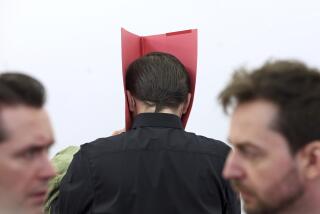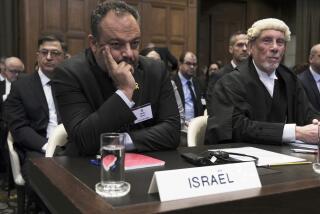German woman’s apology in neo-Nazi killings falls on deaf ears
A German woman charged with being an accomplice in a neo-Nazi killing spree against immigrants apologized to the families of the victims in an emotionally charged court session Wednesday, saying she was “morally guilty” for the deaths of their loved ones.
But Beate Zschaepe, speaking through her lawyer after refusing to answer questions about the case for 2 1/2 years, largely disappointed prosecutors as well as family members in the Munich courtroom when she portrayed herself as a victim of the neo-Nazis and said she had nothing to do with the 10 killings.
Zschaepe, 40, insisted that she did not take part in the crimes: the execution-style killings of eight immigrants from Turkey and one from Greece, as well as the death of one young police officer and two bombings.
NEWSLETTER: Get the day’s top headlines from Times Editor Davan Maharaj >>
Moreover, she denied that she was a co-founder, along with her lovers Uwe Mundlos and Uwe Boehnhardt, of the neo-Nazi group that called itself the National Socialist Underground, or NSU, and did not name any other participants in the killings.
Mundlos and Boehnhardt were found dead in a rented trailer home in 2011 in an apparent murder-suicide. The killings took place from 2000 to 2007.
The spree of anti-immigrant violence attributed to the neo-Nazis has opened German police to accusations they were blind to the dangers posed by the group.
Zschaepe’s 53-page statement, read in court by her lawyer, Mathias Grasel, was criticized by families of the victims as lacking credibility.
They also questioned why she had waited so long to say so little.
“It’s a slap in the face,” Abdulkerim Simsek, the son of the group’s first victim, Enver Simsek, told reporters outside the courthouse. “Her testimony was deplorable, just ridiculous.”
Police, prosecutors and much of the public believe that Mundlos and Boehnhardt had other accomplices. There were hopes that Zschaepe could provide information about that but she had been resiliently silent since the trial began in May 2013.
“I was not involved in any of the preparations nor in carrying out any of the acts,” Zschaepe said, adding that she was pressured into staying silent by Mundlos and Boehnhardt despite her knowledge of the killings.
However, she said: “I sincerely apologize to all of the victims and relatives of victims. I feel morally guilty for not preventing 10 murders and two bomb attacks.”
Although the killings later left Germany chastened, they had initially garnered little notice. The slayings in immigrant communities across the country largely targeted the owners of small shops and doner kebab sandwich stands. They were treated as individual and unrelated acts of violence, and investigators at first pinned the blame on internecine violence in Turkish communities.
The NSU’s existence was discovered in 2011 only after Mundlos and Boehnhardt were found dead and authorities made the connection between the neo-Nazis and the immigrant killings. The two were found shot to death in their smoldering trailer in Eisenach, about 100 miles northeast of Frankfurt, after a bungled bank robbery.
Zschaepe then reportedly set fire to an apartment she shared with the pair in Zwickau, a town about 35 miles from the Czech border. She later turned herself in to police.
Berlin Free University professor Hajo Funke, an expert on Germany’s far right and author of a book on the NSU trial, said Zschaepe’s testimony lacked credibility. He dismissed what he called an attempt to portray herself as a “little housewife.”
“She was involved ... actively and ideologically in the group, with all its violence,” Funke said in an interview. “There’s no credibility in her apology either. She made no effort to tell the whole truth. She could have revealed a lot more about who else might have been involved. She didn’t.”
In her testimony, Zschaepe portrayed herself as a passive bystander who couldn’t muster the strength or courage to leave the two men or go to police because the pair threatened to kill themselves if she did.
She described a difficult childhood and said she met and fell in love with Mundlos as a teenager, joining the far-right scene that spread through formerly communist East Germany after the Berlin Wall fell. On her 19th birthday, she said, she met his friend, Boehnhardt, and fell in love with him.
David Crossland, author of “The Jewish Candidate,” a chilling 2013 novel about secretive neo-Nazi terrorist cells in Germany, said the NSU trial highlights the failure of German authorities to grasp the risk that neo-Nazis pose to immigrants and minorities – who now make up more than 10% of the country’s population of 82 million.
He called her testimony “a cynical ploy to lesson her sentence.”
Kirschbaum is a special correspondent.
ALSO
Affirmative action at universities in doubt as U.S. Supreme Court hears arguments
A century ago, a popular Missouri newspaper demonized a religious minority: Catholics
Middle-class families, pillar of the American dream, are no longer in the majority, study finds
More to Read
Start your day right
Sign up for Essential California for news, features and recommendations from the L.A. Times and beyond in your inbox six days a week.
You may occasionally receive promotional content from the Los Angeles Times.






